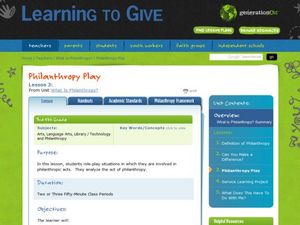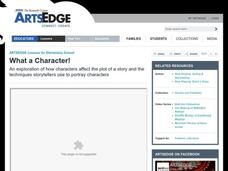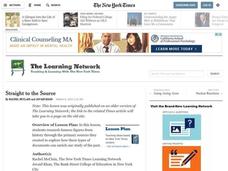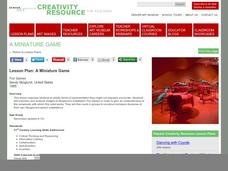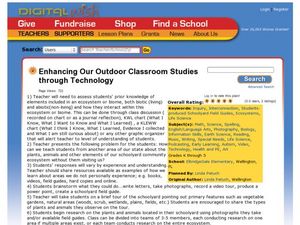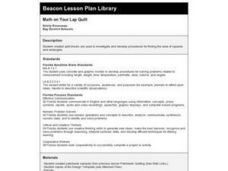Virginia Department of Education
Rotation
Rotate this resource into your lesson plans. Scholars rotate polygons in the coordinate plane by multiples of 90 degrees. They then compare the original and new figures to develop conjectures about coordinate points after rotations.
Curated OER
Jingles Sell
Students explore the different persuasive techniques used in commercial and print advertisements. Students then analyze a variety of print ads and discuss the effects of a country's political, economic, and social climates on its...
Curated OER
Journalism Career Pathway Unit
Students explore a career in journalism while using various forms of technology; such as, distance learning via the Iowa Communications Network (ICN) and the Internet. They have the opportunity to create a final project that is based...
Curated OER
A Safe Place For Hate?
Learners explore the conflict over the admission of hate-related information onto web portals and other web sites, and, after representing the point-of-view of the constituencies involved in this conflict, posit possible solutions to the...
Curated OER
Leveling the Gender Playing Field
Students explore whether or not the gender 'playing field' is becoming more level. They share their views by responding to questions regarding changing attitudes about women and men in the past, present and future.
Curated OER
The Wrath of Hurricane Mitch
Students investigate how hurricanes and other natural disasters can devastate the elements of the infrastructure of a country, as well as the lives of its people.
Curated OER
Amidst the Rubble of Ruined Cities
Students, in committees, develop and propose solutions to rebuild various elements of Colombia's infrastructure in the wake of the January 25, 1999 earthquake, as well as compare and contrast the earthquake's affects on Colombia to an...
Curated OER
Philanthropy Play
Students explore the concept of philanthropy. In this service learning lesson, students simulate and role play people involved in the act of helping others.
Curated OER
Digitized Doctoring
Students explore new medical technologies to exhibit in an Amazing Medical Machines technology fair. They research different types of advanced medical technologies; then create posters to summarize findings and present at a mock medical...
Curated OER
What a Character!
Students look at the role of characters in a story. For this character lesson, students discuss how different types of characters change the plot of the story. They see how storytellers use their body, face, and voice to tell stories.
Curated OER
Recurring Nightmares
Does history really repeat itself? Encourage your middle and high schoolers to answer this age-old question by reading the attached articles on the Cuban Missile Crisis of 1962 and the Iraq Crisis of 2002. How similar or different are...
Curated OER
Shame on You!
Should public humiliation be an acceptable consequence for a crime? Have your middle schoolers engage in a round table discussion about the recent resurgence of the use of public humiliation as a punishment for crimes in the United...
Curated OER
Straight to the Source
Research famous figures from history through the primary sources they created! Explore how these types of documents can enrich our study of the past with your middle and high school learners. They create picture books to illustrate...
Curated OER
Pop Tops
Get your class primed for a comparative analysis lesson with this activity. They compare and contrast their music preferences to those of their classmates. After reading an article, they identify current trends in popular music, analyze...
Curated OER
Give Me Liberty or Give Me Freedom
Welcome to America, the land of liberty and freedom. Examine the ways in which the terms liberty and freedom have been used in the United States. After researching and analyzing quotations from the past and present, students create an...
Curated OER
Noteworthy?
Why do we have CliffsNotes? SparkNotes? Middle and high schoolers examine arguments for and against the recent influx of book notes, or study guides. They stage a debate in which they represent Advocates For or Critics Against the use of...
Curated OER
Hot, Hot, Hot, Cold
Learners dance the image of falling snow. They move, swing, fall, and rise to music working to depict snow falling, the sun, and high/low movements. This is a well-thought out lesson that aids them in seeing movement as a form of...
Curated OER
Fort Life in the Green Bay Area, 1816-1841
Ninth graders examine from the perspectives of military personnel, Native Americans, families of soldiers, and civilians who lived and worked in the region during the era. They create a 2-page scrapbook layout from at least two of the...
Curated OER
Lesson Plan: A Miniature Game
Art inspires art, as children work to understand artistic forms that come from the imagination. They analyze the installation piece, Fox Games and then discuss the design process. They then use clay to create imaginative dioramas,...
Curated OER
Enhancing Our Outdoor Classroom Studies through Technology
Combine science, math, and more using this resource. Learners use technology to share video and other information about their community with people throughout the state. They learn about the environment, identifying native plants, record...
Curated OER
The Natural State
Following an examination of the Arkansas state quarter, your class will discuss the state's nickname: "The Natural State." They will focus on its abundance of natural resources. Printables for the activities are included.
Curated OER
Steer Clear of Trouble
Inform teenagers about safe driving techniques. Young journalists use the Internet to investigate safe driving practices and technologies then publish a manual for the teen drivers in their life.
Curated OER
Math On Your Lap Quilt
Get creative juices flowing when you allow groups to figure out a procedure for how to find the area of squares and rectangles. They may use the individual patchwork blocks, or they may design one using the Design Template.
Curated OER
A Discourse on the History of Language
Analyze and make inferences from the information used by linguists to construct the evolution of languages. They research different dating techniques to explain how scientists infer age with evidence.









